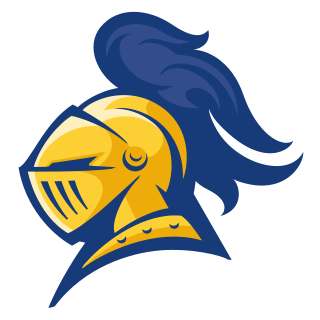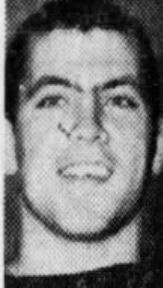
The Minnesota Intercollegiate Athletic Conference is an intercollegiate athletic conference that competes in the National Collegiate Athletic Association (NCAA) Division III. All 13 of the member schools are located in Minnesota and are private institutions, with only two being non-sectarian.

Richard Walter Quick was a Hall of Fame head coach for the women's swim teams at the University of Texas from 1982 through 1988 and at Stanford University, from 1988 through 2005. In an unprecedented achievement, Quick's Women's teams at Texas and Stanford won a combined 12 NCAA National championships, with his Men and Women's team at Auburn winning his final championship in 2009. His teams won a combined 22 Conference championships. He was a coach for the United States Olympic swimming team for six Olympics—1984, 1988, 1992, 1996, 2000 and 2004.
James Steen served as a swim coach at Kenyon College from 1976 to 2012, where he became the first coach in NCAA collegiate history to have his men's and women's teams win a combined 50 Division III NCAA championships.

Edwin Charles Reese is a Hall of Fame American college and Olympic swimming coach, and a former college swimmer for the University of Florida. Reese won 15 NCAA team championships as the head coach of the University of Texas at Austin men's swimming and diving team from 1978 until retiring in 2024, having previously served as the men's head coach at Auburn University from 1973–1978.
Hans F. Dersch is an American former competition swimmer and breaststroke specialist who represented the United States at the 1992 Summer Olympics in Barcelona, Spain.
The Minnesota Rugby Football Union (MNRFU) is the Local Area Union (LAU) for Rugby Union teams in the state of Minnesota. The MNRFU is part of the Midwest Rugby Football Union (MRFU), one of the seven Territorial Area Unions (TAU's) that comprise USA Rugby.
Edwin Jeffrey Saugestad was an American ice hockey coach. From 1958 to 1996, he was the head hockey coach at Augsburg College in Minneapolis, Minnesota. He led the Augsburg hockey team to three National Association of Intercollegiate Athletics men's ice hockey championships and six consecutive Minnesota Intercollegiate Athletic Conference championships from 1976 to 1982. At the time of his retirement in 1996, he ranked second in career wins in NCAA Division III history. He received the John MacInnes Award in 2002 for his lifetime of contributions to amateur hockey and the Hobey Baker Legends of College Hockey Award in 2007. As of 2010, he ranks 18th all-time among college men's ice hockey coaches with 503 wins.
Donald Roberts was an American college men's ice hockey coach. From 1964 to 1997, he was the head hockey coach at Gustavus Adolphus College in St. Peter, Minnesota. At the time of his retirement in 1996, he was the winningest hockey coach in NCAA Division III history. He received the John MacInnes Award from the American Hockey Coaches Association in 1993 and the Hobey Baker Legends of College Hockey Award in 2009. As of 2010, he ranks 15th all-time among college men's ice hockey coaches with 532 wins.

The Carleton Knights football team represents Carleton College in college football at the NCAA Division III level. The program was started in 1883 and was very successful through the early 1960s, winning over 20 conference championships from 1895 to 1956.

The Carleton Knights are the athletic teams that represent Carleton College, located in Northfield, Minnesota, in intercollegiate sports as a member of the NCAA Division III ranks, primarily competing in the Minnesota Intercollegiate Athletic Conference (MIAC) since the 1983–84 academic year; which they were a member on a previous stint from 1920–21 to 1924–25. The Knights previously competed in the Midwest Conference (MWC) from 1925–26 to 1982–83; although Carleton had dual conference membership with the MWC and the MIAC between 1921–22 and 1924–25.
The Bulldogs men's golf team represented the University of Minnesota Duluth (UMD) in the sport of golf from 1947 to 1991. Overshadowed by the school's hockey, football and basketball programs, constrained by parsimonious budgets, disadvantaged by a short spring season, and without athletic scholarships, the UMD golf program was, nonetheless, one of the most successful of the University's intercollegiate athletic programs during its existence. Perennially a conference champion threat with rosters composed of predominately Duluth area athletes, the golf team was one of the first UMD athletic programs to qualify for national championship play and gave the school its first two All-American First Team honorees. During the 45 years of the program, the Bulldogs finished first or second in conference 29 times. Thirteen teams qualified for the NAIA National Championship Tournament and seven were selected to play for the NCAA Division II title. The golf program had the distinction of representing the highest showing for a UMD team of any sport at a national event for 31 years and the highest individual finish for 25 years. Despite its achievements, the UMD golf program was eliminated for the 1991–92 school year, a casualty of athletic department budget cuts.
The 1992 Carleton Knights football team represented Carleton College in the 1992 NCAA Division III football season. Bob Sullivan returned as the head coach, and Gerald Young was hired as the team's new defensive coordinator. The team compiled a 9–1 record and won the Minnesota Intercollegiate Athletic Conference (MIAC) championship, but lost to the Central Dutch in the first round of the NCAA Division III playoffs.
The 1964 Concordia Cobbers football team was an American football team that represented Concordia College of Moorhead, Minnesota, as a member of the Minnesota Intercollegiate Athletic Conference (MIAC) during the 1964 NAIA football season. In their 24th year under head coach Jake Christiansen, the Cobbers compiled a 10–0–1 record, won the MIAC championship, and tied Sam Houston State in the Champion Bowl to share the NAIA national championship.
The 1946 Minnesota Intercollegiate Athletic Conference football season was the season of college football played by the eight member schools of the Minnesota Intercollegiate Athletic Conference (MIAC), sometimes referred to as the Minnesota College Conference, as part of the 1946 college football season.
The 1962 Minnesota Intercollegiate Athletic Conference football season was the season of college football played by the eight member schools of the Minnesota Intercollegiate Athletic Conference (MIAC) as part of the 1962 NCAA College Division football season.

Don Megerle, a competitive swimmer at Bethany College, was a long-serving coach of the men's swimming team at Tufts University, a Division III New England Small College Athletic Conference school. In his 33 years as Tufts Head Coach from 1971 to 2004, he led the team to an overall record of 268-81, producing 92 Division III All-American swimmers, and 2 National champions.
The 1945 Gustavus Adolphus Golden Gusties football team represented Gustavus Adolphus College of St. Peter, Minnesota, as a member of the Minnesota Intercollegiate Athletic Conference (MIAC) during the 1945 college football season. In their second year under head coach Tuddie Lindenberg, the Gusties compiled a 6–0 record, won the MIAC championship, and outscored opponents by a total of 140 to 19.

The 1950 Gustavus Adolphus Golden Gusties football team was an American football team that represented Gustavus Adolphus College of St. Peter, Minnesota, as a member of the Minnesota Intercollegiate Athletic Conference (MIAC) during the 1950 college football season. In their sixth and final year under head coach Lloyd Hollingsworth, the Gusties compiled a 9–2 record, won the MIAC championship, and outscored opponents by a total of 284 to 73. The team won its first nine games before losing to La Crosse State in the last game of the regular season and to Abilene Christian in the Refrigerator Bowl.
Steve Bultman is a former American competitive swimmer for Louisiana State University and an Olympic and college swim coach best known for coaching the Texas A & M Women's team from 1999 through 2024 where he led them to four Big 10 Conference Championships and four consecutive Southeastern Conference Championships from 2016 to 2019. He coached an exceptional total of 16 Olympians in his career.






